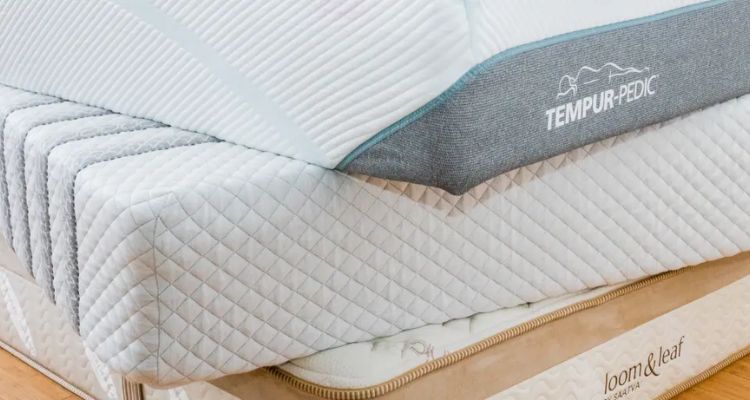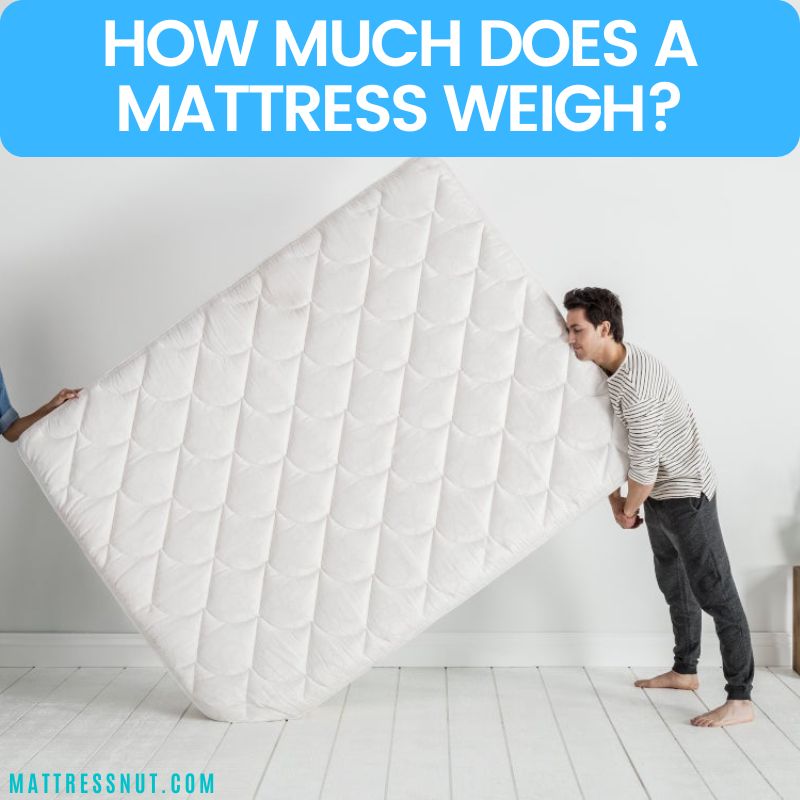There is a common misconception that the higher the weight of the mattress, the better its quality (check the top rated mattresses). But in reality, weight is just a by-product and not a determinant of mattress quality.
The type of the mattress, its size, thickness, and other factors play a significant role in determining its overall weight. Heavier mattresses have more materials in them, and they are tougher to move. So, there are so many other details you need to consider.
This guide will look at different mattress sizes, their weight, and the features that influence the weight. Continue reading till the end and find out more.
Can You Move a Mattress on Your Own?

If you want to purchase a new mattress, you will have to move your mattress. The transportation that you choose and how you will install your mattress will entirely depend upon your personal choices.
People with bad knees or backs or who have large mattresses will need some help when moving their mattresses. When lifting or moving your mattress, it is essential to lift with your legs and not your back.
You can also use a cart when you move your mattress. Compressing your mattress is another option to go for, but it won’t directly impact the overall weight of the mattress.
Mattress Thickness & Weight
A major factor that influences a mattress’s overall weight is its thickness. Of course, a thicker mattress will weigh more than a thinner mattress. Mattress thickness ranges from 6 inches to 14 inches.
And the overall design and construction of a mattress can influence its thickness. For example, how many layers are used and what type of mattress it is. Hybrid mattresses are the thickest because they have combined memory foam and innerspring attributes (check the best selling hybrid mattresses).
Quality mattresses categorized as high-profile beds tend to be 12 to 14 inches thick. Mattress thickness is referred to as mattress height. With more layers and thicker materials, mattresses become much wider or taller.
Some sleepers prefer these high-profile beds because they are slightly easier to use. But high-profile mattresses tend to weigh more because they have more layers and materials.
Type of Mattresses & Weight
Each mattress type has its unique feel. It also has a different weight based on the materials used in the construction. For example, latex mattresses are the heaviest of all mattress types on the market.
| Mattress Type | Weight of Queen Size |
| Hybrid mattresses | More than 100 lbs |
| Innerspring mattresses | 70 lbs |
| Latex mattresses | 140 lbs |
| Memory foam mattresses | 75 to 90 lbs |
Memory foam mattresses
The most common materials used in the construction of mattresses are memory foam, and it’s pretty dense. All-foam mattresses only have memory foam in them with different densities. The top layer has low-density memory foam, the base layer has high-density memory foam, and it is firmer. It might be dense, but it is certainly not the heaviest of all materials.
On the other hand, though, memory foam mattresses are certainly heavier than innerspring mattresses. The weight of a queen-size memory foam mattress is around 75 to 90 lbs depending upon the design and construction.
Innerspring mattresses
These mattresses have spring coils made of steel in them. These coils form the base layer of these mattresses and on top of that is a pillow top layer made of fiberfill or memory foam.
Of course, the support structure is open, making the bed much lighter and easier to move. But the weight of these mattresses depends upon the overall coil count and thickness. The weight of the queen-size innerspring mattress is around 70 lbs based on the coil count and coils gauge in the mattress.
Latex mattresses
These mattresses have pretty much similar properties to memory foam mattresses. So, their density will determine the overall weight of the mattress.
Latex mattresses have more layers than memory foam mattresses. This is another reason why these mattresses are heavier. A queen-size latex mattress weighs around 140 lbs and is the heaviest.
Hybrid mattresses
These mattresses have pressure relieving properties because they have memory foam as the top layer. In contrast, their base has innerspring coils to offer better support and stability. So, they combine the benefits of innerspring mattresses and memory foam mattresses.
Some of them also have a layer of latex right at the top. They are some of the heaviest on the market because they have multiple layers. The weight of a hybrid mattress is over 100 lbs based on the construction, material used, coil gauge, and count.
Airbed mattresses
As these airbeds rely more on air that is filled inside them to offer support and comfort, they are the lightest of all mattresses. These beds are easy to transport, and you can store them conveniently too. But these mattresses are not very durable, so you can use them for temporary purposes.
Mattress Size & Weight

It’s a no-brainer that smaller-sized mattresses are the lightest. With the increase in size, the weight increases as well. A Twin size mattress is the lightest of them all, while a King or a California King mattress is the heaviest.
| Mattress Size | Dimensions | Weight |
| Twin | 38 x 75 inches | 40 to 45 lbs |
| Twin XL | 38 x 80 inches | 43 to 48 lbs |
| Full | 56 x 75 inches | 50 to 60 lbs |
| Queen | 60 x 80 inches | 120 to 160 lbs |
| King | 76 x 80 inches | 130 to 180 lbs |
| California King | 72 x 84 inches | 130 to 180 lbs |
Twin size mattresses
These mattresses are 38 inches in width and 75 inches in length. These are the smallest as well as the lightest mattresses on the market. Twin mattresses are suitable for kids and single adults.
Due to their small size and weight, these mattresses are extremely easy to move, and setting them up is not a hassle. They work great with bunk beds if you want to manage your limited space effectively. Depending on their construction and design, twin mattresses weigh around 40 to 45 lbs.
Twin XL mattresses
These mattresses are almost similar in size to the twin mattresses. However, they are about 5 inches longer than twin mattresses. These mattresses are ideally suitable for taller people (over 6 feet).
Due to their longer design, these beds offer much better leg room to stretch out. Twin XL mattresses weigh around 43 to 48 lbs based on what types of materials they have and their layering.
Full-size mattress
These mattresses measure 56 inches in width and 75 inches in length. They are suitable for single adults and teenagers. These beds provide more sleeping space and weigh around 50 to 60 lbs.
Queen mattress
With 60 inches in width and 80 inches in length, queen-size mattresses are suitable for most people.
These mattresses provide plenty of legroom and sleeping space and work great for couples with limited room space. Queen mattresses weigh around 120 lb to 160 lbs, depending on the construction materials.
King mattress
King size mattresses come 76 inches in width and 80 inches in length. These beds are the largest available in size. These mattresses are excellent for couples because each individual will have plenty of sleeping space and leg room.
The largest beds are also the heaviest, weighing around 130 lbs to 180 lbs. They are suitable for large rooms because they are too big for smaller rooms, and there won’t be much space to move around your room if you place a king-size mattress in a small room.
California King mattresses
With 72 inches in width and 84 inches in length, they have the same surface area as a king bed. But in this case, the bed size is narrower and longer. California king beds are suitable for taller people, providing more leg room. These mattresses weigh around 130 lbs to 180 lbs, just like the king beds.
How Much Does a Mattress Weigh After 10 Years?
Another common misconception is that the mattress’s weight increases after some years. While it might increase weight due to your dead skin cells, hair, dust, dirt from the household, etc., more or less, it remains the same.
But these elements do not contribute significantly to the overall weight of the mattress in the long run. However, if your mattress is exposed to elements such as moisture, it might somewhat affect the weight.
The impact of these elements can be significantly minimized if you take care of your mattress and clean it regularly. Use clean bedding accessories with your mattress, including those pillows and sheets, so your mattress doesn’t accumulate any of these elements over time.
What’s the Lightest Type of a Mattress?
The lightest type of mattress is a futon mattress and airbeds. But these mattresses are not very durable either. So you can’t use them regularly; however, they are suitable for moving around easily.
Smaller-sized mattresses such as Twin and Twin XL are suitable if you are specifically looking for a lightweight mattress. But of course, you will have to compromise on size, especially if you want to share your bed.
Is a Heavier Mattress a Better Choice?
Heavier mattresses often feature multiple layers. And with more layers, they will have more comfort to offer. But the same can’t be said about every mattress.
Instead, you have to decide based on the function of each of these layers. This way, you can make the right decision and get the best value for your hard-earned money.
Does Mattress Weight Really Mattress?
Of course, each dimension, size, and type of mattress weighs differently. But does mattress weight matter? It might not seem that important at first, but it will certainly be a mattress when you clean your mattress or set it up.
Setting up your mattress
When you bring in a new mattress or order it online, you must set it up. And if the mattress is heavy, you won’t be able to do it alone. You will undoubtedly need some help from your friends or family.
Cleaning up your mattress
Mattresses do need cleaning from time to time. You should clean them every 6 months or so. Of course, you will have to lift the mattress and move it as well. You can do this job pretty conveniently if it is the lightest mattress. But cleaning a heavier mattress is a pretty irksome chore.
Design of your mattress
If you love to rearrange your room now and then and move around the furniture, then you must know about the weight of your mattress. It will enable you to manage the task on your own, and you will determine whether you need help or not.
Assists in picking the right bed frame
You will need a bed frame that pairs well with your mattress (also check 10 amazing mattresses for adjustable bed). It must support the weight of your mattress and your weight as well. When you know the weight of the mattress, you will be able to pick the right frame accordingly.
Key Takeaways
The Notion Behind Mattress Weight and Quality
There’s a prevailing thought that a heavier mattress denotes superior quality. However, the actual weight of a mattress is shaped by factors such as its type, size, thickness, and the materials it’s constructed from. It’s important to note that weight alone isn’t a definitive measure of a mattress’s quality.
Decoding Mattress Weight Based on Type
Different types of mattresses come with unique feels and, consequently, varied weights. For instance, latex mattresses top the charts as the heaviest, with a queen-size latex mattress weighing around 140 lbs. Conversely, memory foam mattresses, despite their dense nature, are significantly lighter than their latex counterparts. The weight of innerspring mattresses is determined by their coil count and thickness, while hybrid mattresses, combining the attributes of both innerspring and memory foam, tend to be on the heavier side due to their multiple layers.
Size Matters: Mattress Dimensions and Their Weight
It’s intuitive that a larger mattress will weigh more than a smaller one. From the lightest Twin size mattress, weighing approximately 40 to 45 lbs, to the heftier King or California King, tipping the scales at around 130 to 180 lbs, the weight difference is substantial. It’s paramount to consider the room space and the number of sleepers before opting for a specific mattress size.
Debunking Myths: Mattress Weight Over Time
A common misconception is that mattresses gain significant weight over the years due to the accumulation of dust, dead skin cells, and other elements. While there might be a slight increase, the difference isn’t monumental. Regular maintenance and cleaning can prevent any notable weight changes.
The Implications of Mattress Weight
While the weight of a mattress might not be the primary criterion for most buyers, its implications cannot be overlooked. A heavier mattress can pose challenges during setup, require assistance during cleaning, and influence the choice of a suitable bed frame. Therefore, understanding a mattress’s weight can aid in ensuring a seamless bedroom experience.
Conclusion:
Weight might be a contributing factor in judging the overall quality of the mattress. But it certainly isn’t the only aspect of making your choice. You must consider the general construction of your mattress based on its type.
For example, if you’re looking for a memory foam mattress, you should consider the density of the memory foam used in its construction. And if you are planning to buy an innerspring mattress, you must consider the coil count and gauge used in constructing these mattresses.
Mattress weight does matter, especially if you are looking to move the furniture, are shifting, or even when cleaning. A single person can tackle a lighter mattress but not the heavier mattresses.
Mattress weight FAQs
What’s the average weight of a mattress?
The average weight of a mattress ranges from 50 lbs to 150 lbs. But it entirely depends upon the type of mattress and materials used in its construction. Smaller sizes tend to be lighter, while larger sizes are heavier.
Does the weight of a mattress matter?
Some people look at the width of a mattress more when they go out to buy a new mattress. They do so to judge the quality of the mattress and its transportability. While quality matters a lot, people should consider the mattress type and the materials used in the construction.
You should consider the foam density used in the construction, the ILD rating, coil count and thickness, etc. These are the matrices to determine the overall quality of the mattress; weight is just a by-product here.
Do these mattresses have any weight limit?
All mattresses come with a weight limit regardless of the type or materials used in the construction. A weight limit of a mattress refers to how much weight it can hold or support without the risk of sagging. Full, Twin XL, and Twin mattresses can hold up to 400 lbs. California King, King, and Queen can hold up to 800 lbs.

